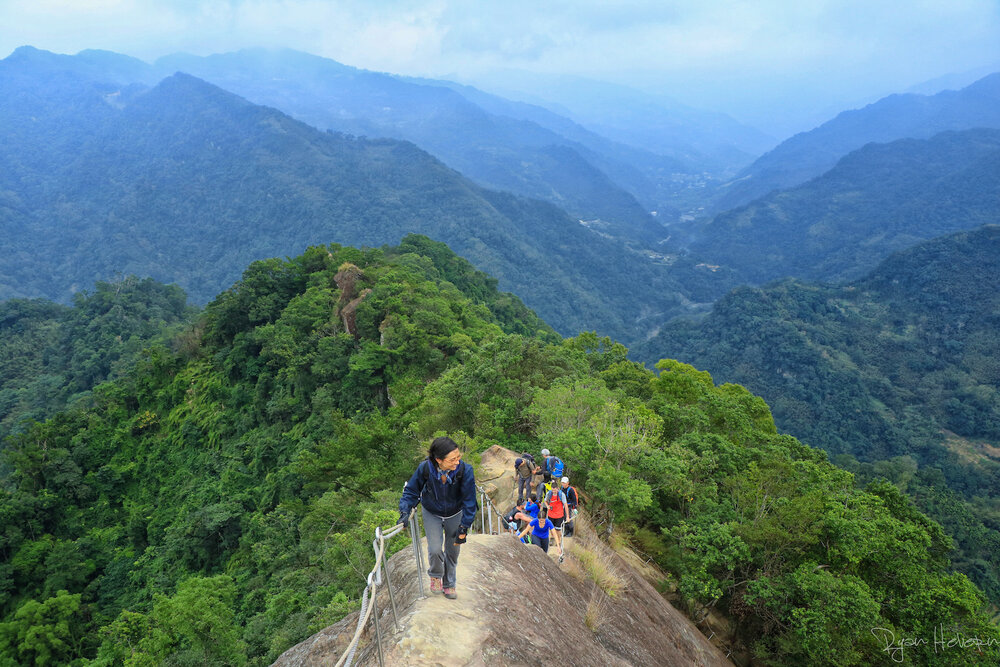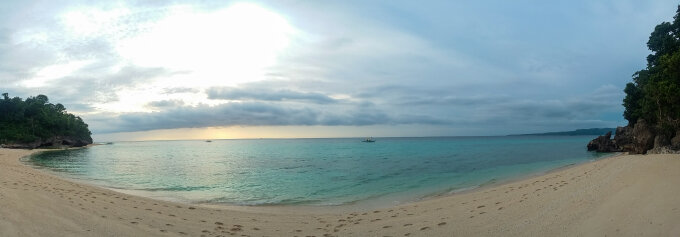_ip3iz7m6wbsrtod7rq4erv.jpg)
Taiwan is a country with a vast network of trails. Spanning coastal views and dense forests, up in the high mountains or down in the valleys, Taiwan’s hikes will allow you to see the best the country has to offer. Here we will focus on day hikes that are both easy to access and are on the more adventurous side!
The Top Five Adventurous Day Hikes in Taiwan
5. Huang Di Dian (皇帝殿)
There’s no better hike to get your blood pumping and calves burning than Huang Di Dian (皇帝殿). Just outside of Taipei, is a fantastic day hike. Huang Di Dian starts in the quiet town of Shiding, climbing an intimidating staircase and high ladders to the seemingly perilous ridges above. Huang Di Dian starts off this list due to the exposed ridge walks, large ladder climbs, and the final chain ascent, which at roughly 60% grade is no small feat! This trek is not for the faint of heart, but what good adventure really is?
_2syd8ep5pom3qsyqy24e58.jpg)
4. Wuliaojian (五寮尖)
Thought of as the big brother to Huang Di Dian, Wuliaojian (五寮尖) is one of the best, most interactive day hikes around Taipei. Start your trip climbing steep slopes and up rugged terrain towards the many peaks which give way to a perfect 360 degree panorama. While you take in the views, descend down treacherous ridges, including the near vertical 30 meter rope descent. Chance seeing monkeys and other intriguing wildlife along the way as you continue. Wuliaojian’s rope climbs, descents, and narrow ridge lines leave a lasting impression on hikers. As you finish, you will want another round!

3. Zhuilu Old Trail (錐麓古道)
Taroko Gorge (太魯閣國家公園) is one of Taiwan’s nine spectacular national parks. None of the day hikes within Taroko are more adventurous than Zhuilu Old Trail (錐麓古道). The trail winds up the mountain, over gaps and suspension bridges, until reaching the old “cross mountain highway”of Taroko. The 500 meters of white knuckle cliff hiking is 1100 meters above the Liwu River. The narrow cliffside of Zhuilu Old trail was used by aboriginal tribes to reach the western side of the Gorge, near Hehuanshan Mountains, until the Japanese invaded and used the same trail to attack and take over the local tribes. It was then turned into a Japanese tourist attraction. Now it is a wonderfully exciting hike, with a required good head for heights, that offers the most spectacular views from within the Gorge.
_teyhxxqx37ewqoobbszwyq.jpg)
2. Yuanzuishan (鳶嘴山)
Yuanzui Mountain (鳶嘴山) is a fun, interactive climb. This adventurous hikes allows hikers to stand above the clouds and take in views of the iconic Jade Mountain in the distance. The Yuanzui Mountain experience is incredible. Pine forests, ridge-line walks, and rope climbs while on this exciting excursion will keep your heart racing. What starts as a straight forward set of stairs quickly turns in to a massive climb up ropes and tricky cliffs. Hair raising, vertical cliffs are the pathway down the backside of the mountain, where you’ll be tested on any fear of heights that might be deep down!
_4qqa3y728maupyv3ukia5h.jpg)
1. Stegosaurus Ridge (劍龍稜)
Stegosaurus Ridge (劍龍稜) is quite possibly the finest day hike in Northern Taiwan. Steg Ridge is also THE MOST adventurous day hike in Taiwan. Think hiking with a hint of bouldering and balance beams.
Hikers will spend a solid hour maneuvering through head high silver grass before balancing and scrambling up a ridge line with sheer drops on either side, with no trail!The knife ridge sticks out above an abandoned copper mine, the blue coastline and links up to Teapot mountain. Scrambling over the trail-less ridge line is exhilarating and challenging, with the opportunity to stand over the cliff on Buddha’s Tongue for a picture perfect moment of excitement.
Stegosaurus Ridge is bound to get your adrenaline pumping from start to finish!
_rsmrc34mikcyjmyp8nrxg0.jpg)
_7r5wa77267c5tsda7rmnsi.jpg)
_kuqyssihaynino6665re84.jpg)
_eo37hd6x4pc23ikq0s74ji.jpg)
_owmsuenog5spt0x2jax7cw.jpg)
_2z863vjs2owx4z3vfzt8hd.jpg)
_gvfwcahxrn0hqxkghfeevv.jpg)
_xxohrtci2isgowg228tonj.jpg)
_kpy3m7xg7ir4cm88yh0z7t.jpg)
_a3og487u548yyiesjf8dtf.jpg)
_6w7nq8ypw86h4xxwqf5wy0.jpg)
-copy_y5dq7a4m2727auf8jw6y6g.jpg)
_7kwfq8u6a6k2bwibbnf7qi.jpg)

_pc27836toavh5irpuy0h6o.jpg)

_uqcr8gmeyq3cdi7as7z7od.jpg)
_nvd8kceyc4qsibg3r5jtxd.jpg)




















_fdmg2cnb60qgjhjngqmc0z.jpg)
-copy_pyecyjeyqqtdfwm5m4z6u3.jpg)
-copy_pt8vrh3iw70gk2gzrao3gg.jpg)
-copy_un7jouakoahu5fjqa60jwj.jpg)

_4zp3v50fmtyz5guu5o6dmt.jpg)
_cxd65vu5rkstbqdpps4ejg.jpg)
_i45q80jx6sbyytwqts5zmb.jpg)
-copy_p232idsz5kua37cjiz4j66.jpg)
_r5us4y46vbxc74vkutrf0h.jpg)
_ecuut0ot5wy30ytn8tso7d.jpg)



_cxpfbw0t6wku8t3koto44z.jpg)

_dsbvmhk4k5aignx8mpapmk.jpg)
_7kjjsk2fh4qptqv5q2dwhg.jpg)
-copy_y08j58hy7dbum78vtmwtzw.jpg)
_ad7ppwfxi3s85mbubq476h.jpg)
_zu37kkuo8pkrpe8v7vgtez.jpg)
_bq8j0b4ssyjt8ha6aupnce.jpg)
_dksyn5o4hv72cdqfcp3fr3.jpg)
_xptcd5sxsmjmfhgdenvb6v.jpg)
_f3sipzce0g82rfy3xsdk0e.jpg)

_e4dyt6sd6bthysqhbpwbfx.jpg)
_aw0qjvnuzud2whj6totcus.jpg)









_0ucbrqwh7fpuz6240ixh64.jpg)
_behnftob875dpm2xjmexet.jpg)
_c37rtn05tjwgyh2vx6su22.jpg)
_4br3ki7078jntcec8hrryd.jpg)
_4eocqca8p3swjjbkx558rj.jpg)
_ifus6sgkgxzamuc320cmg8.jpg)
_2qu5bi84kn3y2oczot777z.jpg)